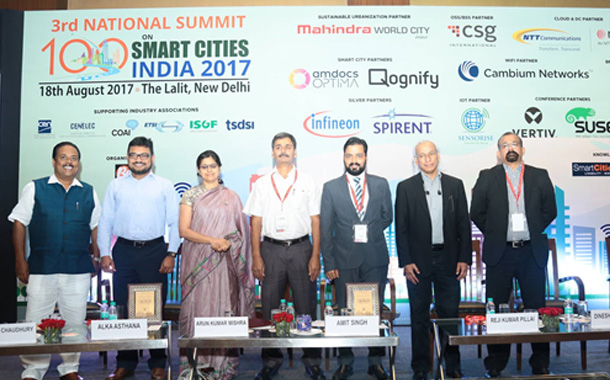As the population of the country increases, the need of the hour is to move towards smarter use of available resources. Indian government’s $7.3 billion Smart City mission is aimed at applying smart solutions to improve infrastructure and service delivery in our cities. Developing world class Smart Cities that meet the objectives of sustainability and improvement in the quality of life is a challenging task.
Acknowledging the great importance of the ‘Smart Cities’ initiative by the Indian Government, Bharat Exhibitions organized the third edition of their industry flagship event ‘National Summit on 100 Smart Cities India 2017,’ which was held on 18th August 2017.
The discussions at the summit revolved around the roadmap for Innovations, sustainability, surveillance and development for Smart Cities. According to the industry estimates, by 2050, about 70 per cent of the Indian population will be living in cities. The Smart City programs that are currently under various stages of development and implementation have to keep this shift into account and to ensure that they are able to provide optimal living conditions and at the same time be beneficial to everyone in the society. In effect, the components of a Smart City would include enabling a better life, with services, mobility, environment, e-governance, economy and sustainability.
Extending a warm welcome to all the delegates and attendees, Shashi Dharan Managing Director, Bharat Exhibitions (organizer of National Summit on 100 Smart Cities India 2017) said, “The Indian government’s vision to create 100 new smart cities to support the rapid urbanization is an important step, as it seeks to provide residents with an efficient and reliable infrastructure, enhanced quality of life and economic opportunities. It is an established fact that without information and communication technologies (ICT) one cannot have a good smart city but there are various other elements too that we need to pay a close attention.”
Amit Singh, Director – Smart Cities, PwC said, “The 100 Smart Cities is no magic wand to address all the problems that we have, but a small attempt to address the rapid urbanization that we are witnessing. The success or failure of this lies in our own hands as the citizens are the most important part of the smart city ecosystem”.
Arun Kumar Mishra, Director, National Smart Grid Mission also touched on the same subject as he went on to share that besides processes and technology, people too will be an important part of the Smart City Grid. He said, “Historically, people were not required to contribute to the Smart City Grid. However, the times are now changing and we cannot go ahead and serve to the demands of people as and when it comes. We need them to have an active participation in the smart city process”.
Everyone on the panel agreed that technology will be a key factor in implementing the smart cities plan but there was also suggestions made on having standardizations in place. Dinesh Chand Sharma, Director – Standard & Public Policy, EU Project, Seconded European Standardization Expert in India (SESEI) stressed about having common architecture in place. He said, “We need to implement technologies that are future proof. There is a set standard that defines ‘Smart City’ but there is a need to have a standard ICT architecture and for surveillance that can be used to plug and play applications.”
Commenting about the challenges and key learning about Smart Cities, Alka Asthana, CTO Bharti Infratel Limited said, “The big challenge right now is that the expectation set has not been standardized”. She talked about the stumbling blocks that they keep encountering at the ground level that lead to increase in the capital expenditures. Giving example of Bhopal, she shared, “The nerve center is not ready in the city and hence the overall implementation and fruits of the implementation are not visible at the ground level”.
“The Smart City mission is the most dynamic and challenging one that we have,” said Swayan Chaudhary, Managing Director and CEO, Panaji Smart City Development Limited. He added, “It is a new process for all involved and the biggest challenge that this mission faces is implementation. Since it is a new process for all involved, the need of the hour is effective consultation. Experts in the domain and industry leaders need to step up and come out with consolations that can help in effective planning and execution of plans.”
The event provided the stakeholders a timely opportunity to discuss the key trends, issues & challenges in smart city development, its market drivers and the outlook for India. Issues such as managing energy crisis, climate changes and disaster risks, challenges in deployment of intelligent transport solutions, role of ICT in E-Governance/M-Governance, the key elements of smart social infrastructure (education, health, etc) and the role of cloud computing in a smarter city were also discussed 100 Smart Cities India 2017 Summit.


